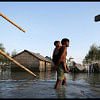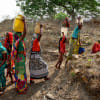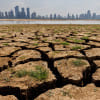A feminist approach to climate solutions

Participation in climate and environmental decision-making is a human right, and the equal participation of people of all genders generates outcomes that are more effective and sustainable. Yet, women are under-represented in decision-making in the landscape of climate negotiations, recent data sheds light on the persistent challenge of achieving gender balance within the UNFCCC space. There are 132 UNFCCC decisions regarding gender, with 54 of them specifically referencing gender balance in decision-making processes. Still, gender balance in the UNFCCC sphere continues to fall short. At COP28, there were 34 percent of women across all national delegations, compared to 31 percent at COP14 in 2008. Only two percent of the delegations at COP28 had an equal number of men and women, while 79 percent of delegations had more men than women. These statistics underscore the ongoing disparity in women's participation in climate negotiations, emphasising the pressing need for more concerted efforts to promote gender balance and inclusivity within the UNFCCC framework.
Women, girls, and gender minorities often bear the brunt of climate change impacts, facing limited access to resources and decision-making power, carrying out caregiving duties during crises, and intersecting vulnerabilities with socioeconomic status. Women's empowerment in climate action involves ensuring their representation in decision-making structures, thus allowing them to contribute their unique knowledge and expertise on climate change. Women's participation in developing funding criteria, allocating resources, and shaping innovative technologies is vital for creating adaptive, appropriate, and sustainable solutions. It is essential to mainstream gender perspectives into national policies, sustainable development plans, and climate interventions to benefit all.
Integration of women's voices and recognising of their agency and leadership in climate governance at local and national levels should be promoted. This needs to happen at global climate discussions and within the private sector. The empowerment of Indigenous and local women in climate leadership roles needs to be supported. It will be a step in the direction of localisation. To enhance conservation efforts and achieve better climate outcomes, it is crucial to promote locally led initiatives for adaptation, with women's participation ensured. It is essential to integrate gender into these operations, ensuring that the transitions in energy; agriculture, food, water, and land; cities; transport; and manufacturing benefit women and men. Women cannot start green businesses or get green jobs if they are tied down with care work. The lack of affordable childcare is also a hindrance. The gaps in ownership of assets and access to finance impact the efforts to boost resilience and adaptive capacity in gender-sensitive ways. Economic disparities intersect with climate injustices, with low-income communities lacking resources for adaptation while wealthier individuals can afford resilient infrastructure.
We need to prioritise resilience focusing on gender-sensitive approaches and initiatives. ActionAid Bangladesh (AAB) involves women in disaster risk management efforts, such as the Women-led Emergency Group (WLEG), which has led responses during disasters since the late 1980s. AAB has supported women's access to Climate Resilience Sustainable Agriculture (CRSA) practices for climate resilience for decades. Bangladesh has created an example of women-led emergency response and adaptation by communities.
Intersectionality is a critical framework for understanding the multifaceted nature of social identities and power structures, recognising that individuals experience overlapping systems of oppression and privilege based on various aspects of their identity, such as race, gender, class, sexuality, and ability. Applying intersectionality to climate activism reveals how environmental issues intersect with social injustices, highlighting the disproportionate impacts of climate change on marginalised communities. Environmental racism, for example, refers to the disproportionate siting of pollution and hazardous waste facilities in marginalised communities, where industrial plants and landfills are often located near low-income neighbourhoods inhabited by racial minorities, resulting in higher rates of pollution-related health issues and vulnerability to climate-related disasters, as seen in the Dalit community in Bangladesh.
Indigenous communities, deeply connected to the land, suffer disproportionate impacts, highlighting the importance of Indigenous knowledge and rights in conservation efforts amidst broader issues of colonisation and systemic injustice. Lastly, people with disabilities face unique challenges in climate-related disasters, necessitating inclusive emergency planning and infrastructure to address accessibility barriers and health conditions exacerbated by environmental changes.
Feminist approaches are put across the discussion on debt and tax from a feminist and climate justice perspective, funding at the nexus of climate and gender, alternatives to the extractive obsession with economic growth, and ways to advance the structural transformation of our economic and financial systems. Patriarchy, entrenched gender inequalities, and traditional power structures inhibit the effectiveness of feminist approaches by limiting women's access to decision-making processes, resources, and opportunities to influence climate policies and interventions. Moreover, limited awareness of the gendered dimensions of climate change among policymakers, practitioners, and community members, coupled with insufficient capacity to implement feminist approaches effectively, further complicates efforts to address the differential impacts of climate change on various gender groups. Additionally, resistance to gender equality initiatives stemming from traditional attitudes and patriarchal norms presents a significant barrier to progress toward more inclusive and equitable climate solutions. Furthermore, limited data and research on the gendered impacts of climate change pose challenges to the development of evidence-based policies and interventions that effectively address the needs of diverse gender groups.
However, despite these challenges, feminist approaches offer significant opportunities for driving positive change. Empowering women and marginalised gender groups, enabling their meaningful participation in decision-making processes, and ensuring equitable access to resources and opportunities are crucial steps toward enhancing the effectiveness and sustainability of climate change mitigation and adaptation efforts. By mainstreaming gender considerations into climate policies and frameworks, feminist approaches can promote synergies between gender equality, climate action, and sustainable development, leading to more integrated and effective policy responses. Moreover, feminist approaches have the potential to catalyse broader social transformation towards more equitable and sustainable societies by challenging patriarchal norms, promoting gender equality, and addressing systemic injustices.
Collaboration between government, non-governmental organisations (I/NGOs), and grassroots organisations are essential for advancing climate and gender justice. By investing in evidence-based policy advocacy, capacity building, and community engagement, NGOs can integrate feminist perspectives into climate change planning processes and empower marginalised voices in decision-making related to climate change adaptation and mitigation. Leveraging strong partnerships with governments, international organisations, and diverse stakeholders enables NGOs to promote women's leadership, foster gender-responsive approaches to climate action, and advocate for the implementation of gender-sensitive policies and programs. Additionally, collaboration with grassroots and local organisations facilitates the implementation of context-specific, community-driven climate solutions, enhances local resilience, and ensures that climate action is inclusive and equitable.
We need policymakers, movers, and shakers (both nationally and globally) to consider funding locally-led Gender Just Climate Solutions; ensuring gender-responsiveness of climate finance; understanding the imperative of financing SRHR for climate justice; prioritising the vision of economic justice by young women, indigenous communities, and address poverty in its multifaceted dimension; making the new Loss and Damage Fund gender-responsive; and decentralising and empowering local government as well as communities, especially women and youth.
By working together, governments, I/NGOs, and grassroots organisations can leverage their unique strengths, expertise, and resources to implement sustainable practices, raise awareness, and influence policy decisions effectively, ultimately contributing to a more just, equitable, and sustainable future for all.
Farah Kabir is a country director at ActionAid Bangladesh. Reach her at [email protected].
Views expressed in this article are the author's own.
Follow The Daily Star Opinion on Facebook for the latest opinions, commentaries, and analyses by experts and professionals. To contribute your article or letter to The Daily Star Opinion, see our guidelines for submission.

 For all latest news, follow The Daily Star's Google News channel.
For all latest news, follow The Daily Star's Google News channel. 












Comments